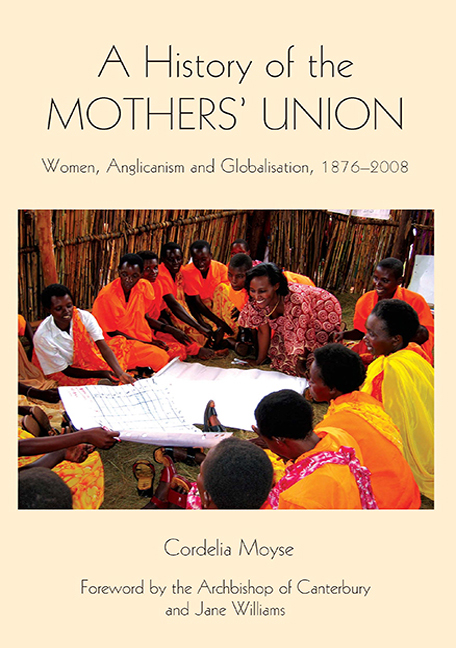Book contents
- Frontmatter
- Contents
- Dedication
- List of Illustrations
- Foreword by the Archbishop of Canterbury and Jane Williams
- Acknowledgements
- Abbreviations
- Introduction
- Part I 1876–1909
- Part II 1910–1944
- Part III 1945–1974
- 8 Identity and Spirituality
- 9 Marriage and Family Life
- 10 Membership and Worldwide Work
- Part IV 1975–2008
- Conclusion
- Appendix 1 Text of early membership cards
- Appendix 2 Development of the Mothers' Union prayer
- Appendix 3 Midday prayers (original)
- Appendix 4 Development of the objects
- Appendix 5 Biographical notes on central and worldwide presidents
- Bibliography
- Index
- Miscellaneous Endmatter
8 - Identity and Spirituality
from Part III - 1945–1974
Published online by Cambridge University Press: 29 April 2017
- Frontmatter
- Contents
- Dedication
- List of Illustrations
- Foreword by the Archbishop of Canterbury and Jane Williams
- Acknowledgements
- Abbreviations
- Introduction
- Part I 1876–1909
- Part II 1910–1944
- Part III 1945–1974
- 8 Identity and Spirituality
- 9 Marriage and Family Life
- 10 Membership and Worldwide Work
- Part IV 1975–2008
- Conclusion
- Appendix 1 Text of early membership cards
- Appendix 2 Development of the Mothers' Union prayer
- Appendix 3 Midday prayers (original)
- Appendix 4 Development of the objects
- Appendix 5 Biographical notes on central and worldwide presidents
- Bibliography
- Index
- Miscellaneous Endmatter
Summary
The MU entered the post-war world with a renewed sense of its mission to the nation. Wartime bombing, evacuation and conscription had disrupted the domestic and community lives of millions. At the same time traditional constraints around sexual activity and alcohol consumption, particularly among the young and women, had weakened. In 1944 the radical Bishop of Birmingham, Ernest Barnes, when surveying family life, claimed that many families had ‘disintegrated’ in the face of total warfare. His remedy for all its consequent social evils ‘was that national home life should be re-established as rapidly as possible’. This was a view shared by many Christians who were politically and theologically poles apart on most other issues.
However the MU's understanding of its mission was shaped not only by this common analysis but also by a corporate sense of past failure and living under God's judgement. At an institutional level failure could be quantified in the loss of 50,000 members during the war years from the astonishing pre-war peak of over 615,000. More importantly as the new President, Mrs Fisher, the zealous wife of the Archbishop of Canterbury, told the Central Council in December 1944, the war had revealed the MU's failure to win the families of the nation for Christ which was ‘the ultimate end of their work’. This she ascribed to the neglect of prayer, the MU's third object. Her confidence that more prayer would translate into the successful evangelisation of the nation was not based on any assessment of post-war realities. In truth in 1944 it would have been impossible to foresee both the challenges and opportunities that would shape the organisation's understanding of its spiritual identity and therefore its mission in the turbulent coming decades.
The sociologist Grace Davie has described the post-war religious landscape of Britain as consisting of three generational shifts: the first two – 1945–60 and the 1960s – match the term of office of Geoffrey Fisher and Michael Ramsey as Archbishop of Canterbury. Her descriptions of what was happening within the Church in these two eras illuminate much of the context in which the MU attempted to provide an attractive model of spiritual life to women while maintaining its organisational identity as the women's organisation of the Anglican Church. Prior to the 1960s the Church was in reconstruction mode trying to ‘put back what had been destroyed and to rebuild the institutions of the past’.
- Type
- Chapter
- Information
- A History of the Mothers' UnionWomen, Anglicanism and Globalisation, 1876–2008, pp. 161 - 186Publisher: Boydell & BrewerPrint publication year: 2009



